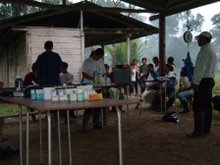I really enjoyed the anthropologic approach to epidemiological transitions in the article assigned last week. The authors seemed to have done a comprehensive review of the current theoretical construct and then re-framed it entirely, just as Dr. Shahi is urging us to do for our topical review papers. The recurring patterns in human history are undeniable and informative--just as hunters and gatherers began to see a spike in infectious disease upon settling into communities, we will likely see new diseases emerge as the rising global population is forced into previously uninhabited areas. The article mentions a history of species jumps from other organisms to humans--as we all know, we're facing this possibility now with H5N1. Migration also has a history of importing disease from one population to another; Columbus may have brought back syphilis from the New World in 1493, and 5 centuries later, a significant percentage of MDR-TB cases are found among immigrants.
It's true that mother nature creates amazing bugs with very interesting properties. Yet, it's also true that we humans have a profound effect on mother nature--our behavior is altering entire ecosystems, which is shocking (e.g., the proliferation of vibrio cholerae due to increased algae blooms from global warming). Better than destroying the entire mosquito population, or pushing for new, stronger, better antibiotics, perhaps we should (also) look for solutions that will last. Whether human behavior changes or not, new bugs will emerge. But changing how we use antibiotics, how we treat the environment, how we live in communities and how we interact globally may determine how well those bugs thrive on us.
Saturday, January 27, 2007
Subscribe to:
Post Comments (Atom)





No comments:
Post a Comment